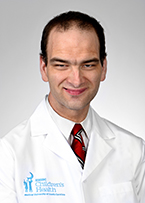John Melville, MD, MS
The Ray E. Helfer Society Recognizes Dr. John Melville for Outstanding Teaching  John Melville, MD, MS, Division Chief, Medical University of South Carolina, received the Helfer Teaching Award for 2019 at the Society’s April meeting in Orlando, Florida. The Teaching Award recognizes the importance of teaching in the promotion of the scientific and humanitarian aspects of child abuse medicine.
John Melville, MD, MS, Division Chief, Medical University of South Carolina, received the Helfer Teaching Award for 2019 at the Society’s April meeting in Orlando, Florida. The Teaching Award recognizes the importance of teaching in the promotion of the scientific and humanitarian aspects of child abuse medicine.
In summarizing Dr. Melville’s qualifications, Wendy Gladstone, MD, FAAP, CAP, provided the following overview:
All members of Helfer have the responsibility for teaching others. We teach the members of our office teams, the staffs and residents of the hospital units where we work, the multidisciplinary teams we collaborate with, judges and juries, the media, parents (biological and foster) and our older patients. Some of us also teach fellows if we are associated with a child abuse fellowship. But who teaches us?
As Helferites, we have reached a stage in our professional lives where our most important teachers are ourselves and each other. We continually review the established medical literature as we address clinical questions and we keep abreast of new information by a critical reading of emerging research. We share what we learn with our colleagues, and in turn learn from them.
John has contributed enormously to our ability to teach ourselves from the medical literature and to learn from each other by developing the Online Bibliography of Child Abuse Pediatrics (OBCAP) and the Expert Witness Database (EWD).
OBCAP organizes child abuse articles in a way to make them readily accessible so that it is much easier to find key publications by topic and study design. OBCAP includes links to The Quarterly Review so that by reading how one of our colleagues assessed a publication, we better understand the article’s scientific merit (or lack thereof).
The Expert Witness Database’s vast resource of legal documents teaches us how our colleagues have applied their knowledge to specific questions that arise in the justice system. The EWD also contains examples of irresponsible testimony so that we may be better prepared to refute unscientific claims in our role as consultants to the courts.
In turn, what we have learned with the assistance of OBCAP and EWD, we share with our trainees and colleagues, medical and non-medical alike.